

A Literature Review on Transcendental and Hermeneutic Phenomenology Christine Daley. A Conceptual Framework for Understanding Transcendental Phenomenology. Phenomenology in Educational Qualitative Research. Phenomenological Research. The purpose of this article is to introduce readers to phenomenological inquiry, an inductive qualitative research approach that is rooted in the philosophical proposition that researchers can gain valuable insight into the structure of how people understand their experiences.
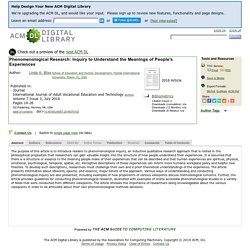
It is assumed that there is a structure or essence to the meaning people make of their experiences that can be described and that human experiences are spiritual, physical, emotional, psychological, temporal, spatial, etc. Perceptive descriptions of these experiences can inform more humane workplace policy and helpful new theories. To develop such descriptions, researchers must challenge their own and a priori theoretical understandings of the experience. The article presents information about lifeworld, epoche, and essence; major tenets of the approach.
Qualitative : Grounded Theory, Ethnography, Phenomenology, others. Interpretive. Final Dissertation REVISED BLUNDELL 4.20. Husserlian Descriptive Phenomenology: A review of intentionality, reduction and the natural attitude. Husserlian Descriptive Phenomenology: A review of intentionality, reduction and the natural attitude Martin Christensen, Anthony Welch, Jennie Barr Abstract Background and aim: Descriptive phenomenology is widely used in social science research as a method to explore and describe the lived experience of individuals.

It is a philosophy and a scientific method and has undertaken many variations as it has moved from the original European movement to include the American movement. The aim of this paper is to describe descriptive phenomenology in the tradition of Edmund Husserl. 10. 588 1831 1 PB. 14 Giorgi. Doing descriptive phenomenological data collection in sport psychology research: Sport in Society: Vol 21, No 2. Descriptive Versus Interpretive Phenomenology: Their Contributions to Nursing KnowledgeQualitative Health Research - Kay A. Lopez, Danny G. Willis, 2004. Differentiating between descriptive and interpretive phenomenological research approaches. - PubMed - NCBI. The Muppets explain Phenomenology. Phenomenology Presentation. Phenomenology Online » Search Results » phenomenology. Phenomenology & Practice (2007 – present) Indo-Pacific Journal of Phenomenology (2001 – present) Phenomenology + Pedagogy (1983 – 1992) The Workout: The Phenomenology of Training Devine, Heather “I train three times a week.”
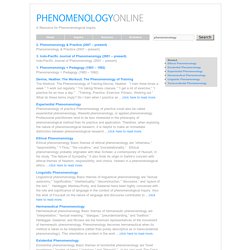
“I work out regularly.” “I’m taking fitness classes.” Journal of Phenomenological Psychology. Editor-in-Chief: James Morley (Ramapo College of New Jersey)Review Editor: Magnus Englander (Malmö University, Sweden)Editors Emeriti: Amedeo Giorgi, US; Frederick J.
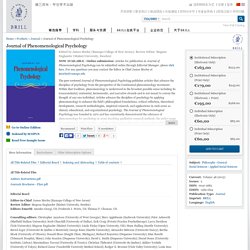
Wertz, US; Thomas F. Cloonan, US. Consulting editors: Christopher Aanstoos (University of West Georgia); Marc Applebaum (Saybrook University); Peter Ashworth (Sheffield Hallam University); Scott Churchill (University of Dallas), Erik Craig (Private Practice Psychotherapy); Larry Davidson (Yale University); Magnus Englander (Malmö University); Linda Finlay (Open University, UK); Steen Halling (Seattle University); Bernd Jager (Université de Québec à Montréal); George Kunz (Seattle University); Alexandre Métraux (Université Nancy); Bertha Mook (University of Ottawa); Donald Moss (Haight Clinic, Michigan); Richard Rojcewicz (Duquesne University); Idun Røseth (Telemark Hospital, Skien); John Scanlon (Duquesne University); David L. Special Issue: The Phenomenological Psychological Method of Amedeo P.
Giorgi Editor’s Note. Phenomenology Links. The study of phenomenology and its purpose. Understanding the meaning of people's lived experiences is the focus of phenomenology (McConnell-Henry, Chapman, & Francis, 2009).
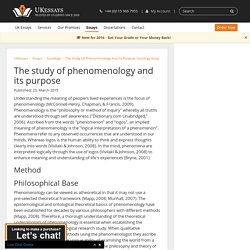
Phenomenology is the "philosophy or method of inquiry" whereby all truths are understood through self awareness ("Dictionary.com Unabridged," 2006). Ascribed from the words "phenomenon" and "logos", an implied meaning of phenomenology is the "logical interpretation of a phenomenon". Phenomena refer to any observed occurrences that are understood in our minds. Whereas logos is the human ability to think and express thoughts clearly into words (Vivilaki & Johnson, 2008). Example: Descriptive Phenomenology - Psychology. Phenomenological Sociology. Phenomenology (psychology) The quality or nature of a given experience is often referred to by the term qualia, whose archetypical exemplar is "redness".
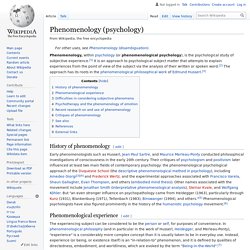
For example, we might ask, "Is my experience of redness the same as yours? " While it is difficult to answer such a question in any concrete way, the concept of intersubjectivity is often used as a mechanism for understanding how it is that humans are able to empathise with one another's experiences, and indeed to engage in meaningful communication about them. The phenomenological formulation of Being-in-the-World, where person and world are mutually constitutive, is central here. Jump up ^ Hardy Leahy, Thomas (2001). Qualitative Research: Phenomenology. Phenomenology Research. Groenewald, (2004). A Phenomenological Research Design Illustrated.
4,551 PHENOMENOLOGY PowerPoint PPTs on PowerShow.com. Powerpoint Presentations and Slides » View and Download. Phenomenology - Chemistry PPT Presentation Summary : Phenomenology Kirsten Casey Anne Arundel Community College Introduction Originated by philosophers such as Husserl, Schutz and Merleu-Ponty A framework for providing ...

Source : Phenomenology & Grounded Theory PPT Presentation Summary : Phenomenology & Grounded Theory Qualitative Research Methods Phenomenology History First used by Johann Heinrich Lambert - Later used by Immanuel Kant and Johann ... Lecture on Phenomenology. Phenomenological Psychology. Phenomenological psychology is the use of the phenomenological method to gain insights regarding topics related to psychology.
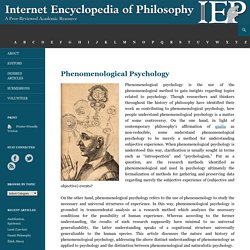
Though researchers and thinkers throughout the history of philosophy have identified their work as contributing to phenomenological psychology, how people understand phenomenological psychology is a matter of some controversy. On the one hand, in light of contemporary philosophy’s affirmation of qualia as non-reducible, some understand phenomenological psychology to be merely a method for understanding subjective experience. PHENOMENOLOGY. Phenomenology comes from the academic disciplines of philosophy and psychology, and it is based upon the work of the 20th. century philosopher Edmund Husserl, which was then later developed by Heidegger.
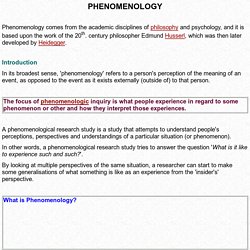
Introduction In its broadest sense, 'phenomenology' refers to a person's perception of the meaning of an event, as opposed to the event as it exists externally (outside of) to that person. DifferencesBetweenPhenomenologicalResearchAndBasicQualitativeResearchDesign. Phenomenology in nursing research: methodology, interviewing and transcribing.
Author Paula Balls, PGCE, BSc, RN, is practice and education facilitator, Norfolk and Norwich University Hospitals NHS Foundation Trust.

Phenomenology in My Future Research. Creswell (1998) states “a phenomenological study describes the meaning of the lived experience for several individuals about a concept or phenomenon” (p. 51). I will use this approach in my future research. I choose phenomenological research because it involves both rich description of the lifeworld or lived experience, and where I will adopt a special, open phenomenological attitude which, at least initially, refrains from importing external frameworks and sets aside judgements about the realness of the phenomenon. Debating Phenomenological Research Methods. VALIDITY ISSUES IN PHENOMENOLOGICAL RESEARCH:BRIDGING THEORY AND. Rigour in phenomenological research: Reflections of a novice nurse researcher. Bracketing in Phenomenological Research Designs. PHENOMENOLOGICAL DATA ANALYSIS. As with all qualitative data, phenomenological data analysis involves such processes as coding (open, axial, and selective), categorising and making sense of the essential meanings of the phenomenon.
As the researcher works/lives with the rich descriptive data, then common themes or essences begin to emerge. This stage of analysis basically involves total immersion for as long as it is needed in order to ensure both a pure and a thorough description of the phenomenon. Method of analysis The structure of phenomena is the major finding of any descriptive phenomenological inquiry. This structure is based upon the essential meanings that are present in the descriptions of the participants and is determined both by analysis (as detailed below), and also by your (intuitive) insights.
Phenomenological Analysis. Phenomenological analysis is based on discussions and reflections of direct sense perception and experiences of the researched phenomenon. A starting point of the strategy is your ability to approach a project without a priori assumptions, definitions or theoretical frameworks. A key aspect of this method of analysis is phenomenological reduction. You need to eliminate any factors, which disturb your perceptions or which you consider as outside factors.
As phenomenological research is based on either your own or other people’s experiences and perceptions of the phenomenon, so too does phenomenological analysis focus on either your own or other people’s experiences and perceptions of the phenomenon. A Way of Seeing People and Place: Phenomenology in Enviornment-Behavior Research. Home Back to "articles" Phenomenology, Place, Environment, and Architecture:
Englander 2012 The Interview Data Collection in Descriptive Phenomenological Human Scientific Research. Disclosing the Making of Phenomenological Research: Setting Free the Meanings of Discourse. Seaweedphenomenologyresearch. Wertz: Comparison of Designs. Phenomenological research designs. Phenomenological Research. Exploring lived experience. Ethnographic vs Phenomenological Research Designs. DissertationProposal SampleQualitative Robert Maldonado. Qualitative Research: Phenomenology. 1. Phenomenology Online » Sources. Example Dissertation: Phenomenological Design Applied to Education.
A Phenomenological Research Inquiry of Lived Experience. IIER 16: Bednall - epoche and bracketing within the phenomenological paradigm. Issues In Educational Research, Vol 16, 2006[ Contents Vol 16 ] [ IIER Home ] John BednallThe University of Notre Dame of Australia Sixteen Heads of Anglican and Uniting Church independent schools were asked to describe their experiences of providing leadership to religiosity in their schools. It was found that there was a common but strong ironic tension characterising how each of the affiliated Churches engaged with the religious culture of their schools.
Interviewing: Phenomenology vs. Grounded Theory. 03KFlemke Chpt2LitReview. Seamon Way of Seeing. Finding the Typical. When the empirical material consists of a number of cases or objects - such as products, ways of using them, or customers - that are in some respects similar but in other respects not quite similar, you sometimes would like to describe the entire class by finding the typical case, from which all the other cases differ as little as possible. For much the same target, some researchers use the word "defining the essence" of a genre of objects. In another project you perhaps are accepting that there may be important differences between the empirical cases, which difference usually becomes visible as a large variation in the measurements, too.
In such a project you might want to point out, not one typical case but instead a few different typical cases, which approach sometimes is called constructing a typology for the material. It is discussed on the page Classification. All the above alternatives are discussed separately below. Quantitative data Pictorial Material Qualitative Material. The Basic Problems of Phenomenology. Max van Manen » Biography. Max van Manen was born and raised in Hilversum (1942), the Netherlands, where he completed the State Pedagogical Academy with teaching qualifications for all levels (K-12) and a major in teaching English as a Second Language.
Alfred Schutz, phenomenology and research methodology for information behaviour research. Professor T.D. Giorgi. Article Giorgi. Husserlian phenomenological approach. Moustakasê Phenomenology: Husserlian? - Saybrook University. Edmund Husserl Students new to phenomenological psychology often ask me what is the difference between Clark Moustakas’ and Amedeo Giorgi’s research methods, since both approaches are called “phenomenological.” In fact, there are major differences. Derrida’s reconfiguration of phenomenology. Abstract.